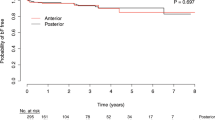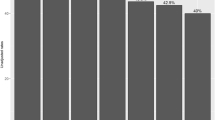Abstract
Prostate growth is dependent on circulating androgens, which can be influenced by hepatic function. Liver disease has been suggested to influence prostate cancer (CaP) incidence. However, the effect of hepatic function on CaP outcomes has not been investigated. A total of 1181 patients who underwent radical prostatectomy (RP) between 1988 and 2008 at four Veterans Affairs hospitals that comprise the Shared Equal Access Regional Cancer Hospital database and had available liver function test (LFT) data were included in the study. Independent associations of LFTs with unfavorable pathological features and biochemical recurrence were determined using logistic and Cox regression analyses. Serum glutamic oxaloacetic transaminase (SGOT) and serum glutamic pyruvic transaminase (SGPT) levels were elevated in 8.2 and 4.4% of patients, respectively. After controlling for CaP features, logistic regression revealed a significant association between SGOT levels and pathological Gleason sum ⩾7(4+3) cancer (odds ratio=2.12; 95% confidence interval=1.11–4.05; P=0.02). Mild hepatic dysfunction was significantly associated with adverse CaP grade, but was not significantly associated with other adverse pathological features or biochemical recurrence in a cohort of men undergoing RP. The effect of moderate-to-severe liver disease on disease outcomes in CaP patients managed non-surgically remains to be investigated.
This is a preview of subscription content, access via your institution
Access options
Subscribe to this journal
Receive 4 print issues and online access
$259.00 per year
only $64.75 per issue
Buy this article
- Purchase on Springer Link
- Instant access to full article PDF
Prices may be subject to local taxes which are calculated during checkout
Similar content being viewed by others
References
Gann PH, Hennekens CH, Ma J, Longcope C, Stampfer MJ . Prospective study of sex hormone levels and risk of prostate cancer. J Natl Cancer Inst 1996; 88: 1118–1126.
Severi G, Morris HA, MacInnis RJ, English DR, Tilley W, Hopper JL et al. Circulating steroid hormones and the risk of prostate cancer. Cancer Epidemiol Biomarkers Prev 2006; 15: 86–91.
Thompson IM, Goodman PJ, Tangen CM, Lucia MS, Miller GJ, Ford LG et al. The influence of finasteride on the development of prostate cancer. N Engl J Med 2003; 349: 215–224.
Bañez LL, Hamilton RJ, Partin AW, Vollmer RT, Sun L, Rodriguez C et al. Obesity-related plasma hemodilution and PSA concentration among men with prostate cancer. JAMA 2007; 298: 2275–2280.
Freedland SJ, Platz EA, Presti Jr JC, Aronson WJ, Amling CL, Kane CJ et al. Obesity, serum prostate specific antigen and prostate size: implications for prostate cancer detection. J Urol 2006; 175: 500–504.
Presti Jr JC, Lee U, Brooks JD, Terris MK . Lower body mass index is associated with a higher prostate cancer detection rate and less favorable pathological features in a biopsy population. J Urol 2004; 171: 2199–2202.
Maruyama Y, Adachi Y, Aoki N, Suzuki Y, Shinohara H, Yamamoto T . Mechanism of feminization in male patients with non-alcoholic liver cirrhosis: role of sex hormone-binding globulin. Gastroenterol Jpn 1991; 26: 435–439.
Luppa PB, Thaler M, Schulte-Frohlinde E, Schreiegg A, Huber U, Metzger J . Unchanged androgen-binding properties of sex hormone-binding globulin in male patients with liver cirrhosis. Clin Chem Lab Med 2006; 44: 967–973.
Lindholm J, Fabricius-Bjerre N, Bahnsen M, Boiesen P, Hagen C, Christensen T . Sex steroids and sex-hormone binding globulin in males with chronic alcoholism. Eur J Clin Invest 1978; 8: 273–276.
Wang YJ, Wu JC, Lee SD, Tsai YT, Lo KJ . Gonadal dysfunction and changes in sex hormones in postnecrotic cirrhotic men: a matched study with alcoholic cirrhotic men. Hepatogastroenterology 1991; 38: 531–534.
Dennis LK . Meta-analysis for combining relative risks of alcohol consumption and prostate cancer. Prostate 2000; 42: 56–66.
Breslow RA, Weed DL . Review of epidemiologic studies of alcohol and prostate cancer: 1971–1996. Nutr Cancer 1998; 30: 1–13.
Sesso HD, Paffenbarger Jr RS, Lee IM . Alcohol consumption and risk of prostate cancer: the harvard alumni health study. Int J Epidemiol 2001; 30: 749–755.
Platz EA, Leitzmann MF, Rimm EB, Willett WC, Giovannucci E . Alcohol intake, drinking patterns, and risk of prostate cancer in a large prospective cohort study. Am J Epidemiol 2004; 159: 444–453.
Albertsen K, Gronbaek M . Does amount or type of alcohol influence the risk of prostate cancer? Prostate 2002; 52: 297–304.
Breslow RA, Wideroff L, Graubard BI, Erwin D, Reichman ME, Ziegler RG et al. Alcohol and prostate cancer in the NHANES I epidemiologic follow-up study. First national health and nutrition examination survey of the united states. Ann Epidemiol 1999; 9: 254–261.
Barba M, McCann SE, Schunemann HJ, Stranges S, Fuhrman B, De Placido S et al. Lifetime total and beverage specific—alcohol intake and prostate cancer risk: a case-control study. Nutr J 2004; 3: 23.
Schatzl G, Madersbacher S, Thurridl T, Waldmuller J, Kramer G, Haitel A et al. High-grade prostate cancer is associated with low serum testosterone levels. Prostate 2001; 47: 52–58.
Lucia MS, Epstein JI, Goodman PJ, Darke AK, Reuter VE, Civantos F et al. Finasteride and high-grade prostate cancer in the prostate cancer prevention trial. J Natl Cancer Inst 2007; 99: 1375–1383.
Pugh RN, Murray-Lyon IM, Dawson JL, Pietroni MC, Williams R . Transection of the oesophagus for bleeding oesophageal varices. Br J Surg 1973; 60: 646–649.
Akdogan M, Hassoun BS, Gurakar A, El-Sahwi K, Jazzar A, Wright H et al. Prostate-specific antigen levels among cirrhotic patients. Int J Biol Markers 2002; 17: 161–164.
Kubota Y, Sasagawa I, Sinzawa H, Kunii T, Itoh K, Miura H et al. Serum levels of free and total prostate-specific antigen in males with liver cirrhosis. Eur Urol 1999; 36: 409–412.
Cetinkaya M, Cetinkaya H, Ulusoy E, Baz S, Memis A, Yasa H et al. Effect of postnecrotic and alcoholic hepatic cirrhosis on development of benign prostatic hyperplasia. Prostate 1998; 36: 80–84.
Velicer CM, Kristal A, White E . Alcohol use and the risk of prostate cancer: results from the VITAL cohort study. Nutr Cancer 2006; 56: 50–56.
Acknowledgements
This study was supported by the Department of Veterans Affairs, Department of Defense Prostate Cancer Research Program, the Georgia Cancer Coalition, the American Urological Association Foundation/Astellas Rising Star in Urology Award, National Institutes of Health R01 CA100938, and National Institutes of Health Specialized Programs of Research Excellence Grant P50 CA92131-01A1.
Author information
Authors and Affiliations
Corresponding author
Ethics declarations
Competing interests
The authors declare no conflict of interest.
Rights and permissions
About this article
Cite this article
Bañez, L., Loftis, R., Freedland, S. et al. The influence of hepatic function on prostate cancer outcomes after radical prostatectomy. Prostate Cancer Prostatic Dis 13, 173–177 (2010). https://doi.org/10.1038/pcan.2010.3
Received:
Revised:
Accepted:
Published:
Issue Date:
DOI: https://doi.org/10.1038/pcan.2010.3
Keywords
This article is cited by
-
The resilience of men: quality of life after prostate cancer
Nature Reviews Urology (2019)
-
Long-term allopurinol use decreases the risk of prostate cancer in patients with gout: a population-based study
Prostate Cancer and Prostatic Diseases (2017)
-
The significance of De Ritis (aspartate transaminase/alanine transaminase) ratio in predicting pathological outcomes and prognosis in localized prostate cancer patients
International Urology and Nephrology (2017)
-
Urologische Aspekte bei Patienten mit Leberzirrhose
Der Urologe (2016)
-
Preoperative weight change and risk of adverse outcome following radical prostatectomy: results from the Shared Equal Access Regional Cancer Hospital database
Prostate Cancer and Prostatic Diseases (2011)



